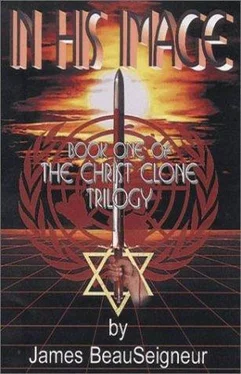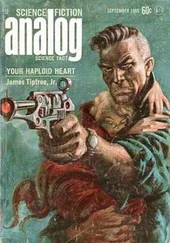At that moment the air around them began to rumble and convulse, finally culminating in the sound of an explosion, followed almost immediately by the screaming whine of a disabled Israeli jet as it careened in a tight spiral toward the ground. From inside the car it was impossible to determine what the sound was, but from the unearthly noise that shook the ground around them, it sounded like the gates of hell were opening.
The pilot was already dead as the jet slammed headlong into the side of a six story office building just two blocks away from where Polucki had brought the car to a screeching halt. His foot was planted firmly on the brake, and his fingers were locked around the steering wheel, but it did little to steady his shaking hands.
Tom was shaking too, but he grabbed his camera and jumped out of the car to get a shot of the destruction. "Wait here," he told his young escort. Nigel didn't argue – he needed a few minutes to steady his nerves before he would feel ready to drive again. Tom had walked only about thirty yards when again he heard the roar of jet engines. To his left, the horizon was filled with the wingspan of an oncoming Libyan MIG.
Flying just above the rooftops, the plane's engines swallowed up huge gulps of air as it passed directly over Tom's head, followed a moment later by a second jet, an Israeli Eagle, in hot pursuit. The MIG maneuvered sharply to the right and the Israeli followed. The Libyan went left, but the Israeli was right behind him. Then, as Tom recorded the images of the duel on his digital camera, the Libyan made what Tom thought was a fatal mistake: he started to climb. Tom knew the MIG could never match the Eagle in climbing speed. The Israeli closed on his target. As the two planes streaked skyward, the Eagle released a sidewinder air-to-air missile, just as Tom expected.
The missile closed in for the kill and Tom readied his camera to capture the moment of impact. But at what seemed the last possible second, the MIG rolled into a dive. It was a good maneuver, but it had come an instant too late. The heat-seeking missile had caught his scent and turned with him. Downward the MIG sped, racing for its life against the single-minded sidewinder. Soon the pilot would have to pull up, and when he did the loss of speed would allow the missile to overtake him.
Closer and closer he came to the ground, maintaining his course as long as possible in order to build speed. A few seconds more and it would be too late to pull up; the MIG would crash into the earth, followed by the unrelenting sidewinder.
The flyer made a valiant attempt, but as he passed the point at which Tom thought he must pull up, it seemed all had been in vain. Tom readied his camera to record the crash as, finally, the pilot raised the plane's nose. It's too late, Tom thought, but to his amazement the pilot raised the machine in a tight arch that missed the tops of buildings by less than fifty yards. The plane shook violently at the demanding effort but the pilot held its course, streaking directly overhead. The missile began to follow but was unable to fully make the radical course adjustment.
As Tom searched the sky for the trailing missile it suddenly came into full view. It was headed directly towards them. As the missile pierced the metal roof of Nigel's Mercedes it exploded in a sun-bright flash, killing Nigel instantly as his body disintegrated into minute particles and joined the wash of other charred projectiles flying in all directions at cyclone speed. Before Tom could even blink, small shards of steel and glass cut painful, bloody paths as they sank deep into his face and eyes, followed an instant later by the car's hood, which knocked him violently to the street.
Derwood, Maryland
Decker sat at the computer in his study, typing up the profile piece on Ambassador Hansen. It was early morning, a few minutes before 6:00. He would e-mail the article to News World later in the day, but there was no rush. The real news was the war in the Middle East. Hansen's profile would probably make for an interesting sidebar story to the war. Decker's angle was to look at Hansen as the man who almost stopped the war. It was an exaggeration, but he would tone it down in the body of the story.
In Louisa's old room, Decker could hear Christopher's alarm clock ringing. He was starting school in a few days and he wanted to re-adjust to early mornings. By the time Christopher was dressed, Decker had breakfast on the table.
"Good morning, sleepy head," Decker said when Christopher came into the kitchen. "I fixed your favorite: waffles and syrup with plenty of bacon on the side!"
Christopher gave Decker a knowing smile and responded, "Uh, Mr. Hawthorne, as I recall, that's your favorite breakfast. Remember?"
Decker put his hand over his mouth and gasped in mock surprise. "Why, so it is!" he said, continuing the act. "Well, now isn't that a wonderful coincidence!" Decker laughed at his own joke and reached for the remote control to turn on the kitchen TV set. It was 6:30 and the news was just starting. "Our top story," the news anchor said, "is the war in the Middle East. For two reports we go to Peter Fantham in Tel Aviv and James Worschal at the State Department. Peter?"
"Thanks John. Today is the Sabbath in Israel, a day of rest, but few are resting. Last night, just after dusk, as the Sabbath began, Syrian, Libyan and Iraqi jets penetrated Israeli air space, headed for dozens of strategic targets. At the same time, Syrian ground forces crossed into Israel from Syria and Lebanon, supported by additional ground forces from Jordan. Throughout the night and into the late morning, widespread fighting has continued on several fronts with heavy casualties on both sides.
"Behind me are the still smoldering remains of an American-made F-15 Eagle, one of the most modern planes in the Israeli arsenal, shot down last night in a dogfight over Tel Aviv by a Libyan MIG-25. But sources tell CNN that while there may have been far more Libyan and Iraqi MIGs than Israeli aircraft shot down in last night's fighting, the real story of the first day of this war was not in the air, but on the ground.
"CNN has learned that most of the Israeli Air Force never even got in the air. According to one source, dozens of Israeli fighters and bombers were destroyed and had to be bulldozed off runways to allow undamaged planes to take off. The Israeli military has refused comment and has ignored requests to allow our camera crew onto any of their bases, but unofficial estimates of losses range as high as sixty percent of the entire Israeli Air Force. If these figures are correct, Israel may be in a struggle for its very existence."
The scene switched to another reporter standing in a large hall with flags of various nations behind him. The caption identified the man as James Worschal and the place as the U.S. State Department.
"This is the fourth time Israel has been in an actual war with her Arab neighbors," the reporter began, "Each time before, she has emerged the victor against far superior numbers. But this time the odds seem to have changed dramatically in favor of her Arab neighbors.
"In the past, Israel has depended on four basic strategic advantages: superior intelligence capabilities; more highly trained and motivated soldiers and officers; a world-class air force; and distrust and disorganization among Arab allies at the command level. But this morning three of those four strategic advantages seem to have been severely damaged or lost altogether.
"The successful attack not only decimated the machinery of the Israeli Air Force, as Peter Fantham just reported from Tel Aviv, it has also shown that the perennial problem of cooperation between Arab states may have come to an end. Military experts tell CNN that last night's unified attack was nearly flawless. The level of coordination between the Syrians, Libyans, Iraqis, and Jordanians was a classic display of synchronized modern warfare. In part, at least, the Arab participants can thank the United States for that. U.S. military sources all seem to agree that the experience gained by Syria while working with the U.S. during Operation Desert Storm in 1991 played a large role in the success of this attack.
Читать дальше












